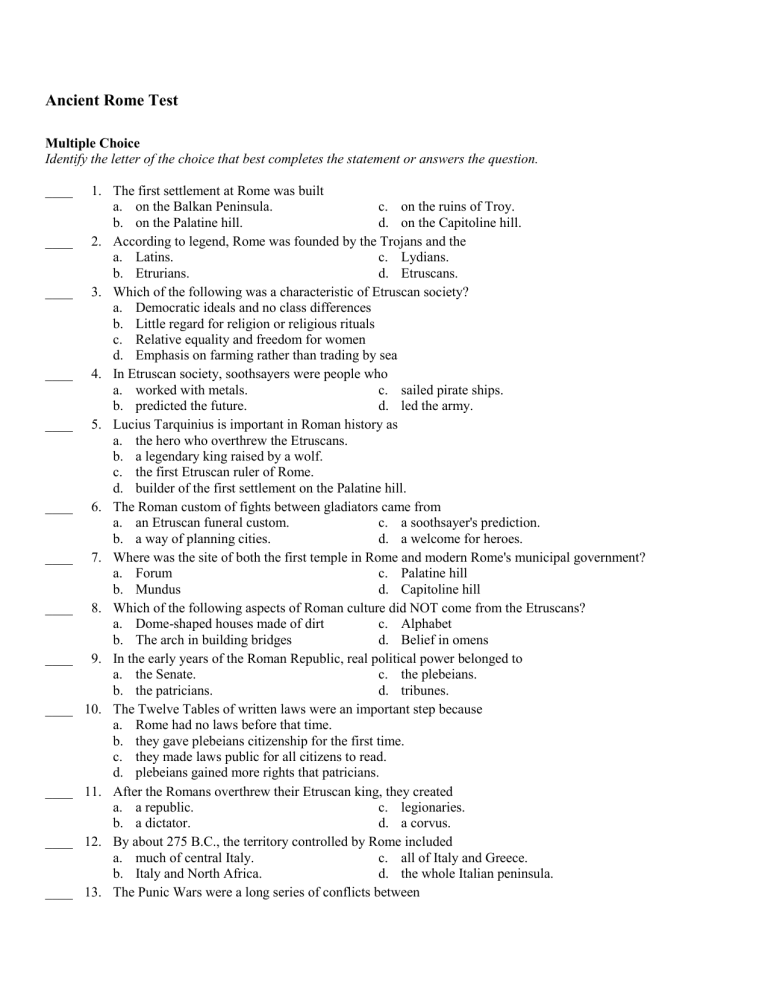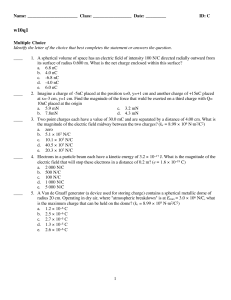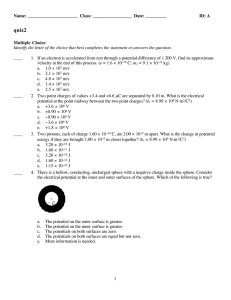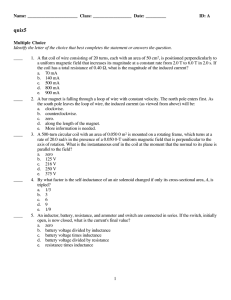Ancient Rome Test: Multiple Choice, Matching, Short Answer
advertisement

Ancient Rome Test Multiple Choice Identify the letter of the choice that best completes the statement or answers the question. ____ ____ ____ ____ ____ ____ ____ ____ ____ ____ ____ ____ ____ 1. The first settlement at Rome was built a. on the Balkan Peninsula. c. on the ruins of Troy. b. on the Palatine hill. d. on the Capitoline hill. 2. According to legend, Rome was founded by the Trojans and the a. Latins. c. Lydians. b. Etrurians. d. Etruscans. 3. Which of the following was a characteristic of Etruscan society? a. Democratic ideals and no class differences b. Little regard for religion or religious rituals c. Relative equality and freedom for women d. Emphasis on farming rather than trading by sea 4. In Etruscan society, soothsayers were people who a. worked with metals. c. sailed pirate ships. b. predicted the future. d. led the army. 5. Lucius Tarquinius is important in Roman history as a. the hero who overthrew the Etruscans. b. a legendary king raised by a wolf. c. the first Etruscan ruler of Rome. d. builder of the first settlement on the Palatine hill. 6. The Roman custom of fights between gladiators came from a. an Etruscan funeral custom. c. a soothsayer's prediction. b. a way of planning cities. d. a welcome for heroes. 7. Where was the site of both the first temple in Rome and modern Rome's municipal government? a. Forum c. Palatine hill b. Mundus d. Capitoline hill 8. Which of the following aspects of Roman culture did NOT come from the Etruscans? a. Dome-shaped houses made of dirt c. Alphabet b. The arch in building bridges d. Belief in omens 9. In the early years of the Roman Republic, real political power belonged to a. the Senate. c. the plebeians. b. the patricians. d. tribunes. 10. The Twelve Tables of written laws were an important step because a. Rome had no laws before that time. b. they gave plebeians citizenship for the first time. c. they made laws public for all citizens to read. d. plebeians gained more rights that patricians. 11. After the Romans overthrew their Etruscan king, they created a. a republic. c. legionaries. b. a dictator. d. a corvus. 12. By about 275 B.C., the territory controlled by Rome included a. much of central Italy. c. all of Italy and Greece. b. Italy and North Africa. d. the whole Italian peninsula. 13. The Punic Wars were a long series of conflicts between ____ 14. ____ 15. ____ 16. ____ 17. ____ 18. ____ 19. ____ 20. ____ 21. ____ 22. ____ 23. ____ 24. ____ 25. ____ 26. a. Greece and Rome. c. Generals Marius and Sulla. b. Rome and Carthage. d. Romans and Etruscans. Rome's victories in the Punic Wars brought it territory in a. Macedonia and Syria. c. Spain, North Africa, and Sicily. b. Greece and its islands. d. Etruria and northern Italy. Which of these was NOT a cause of hardship for Roman farmers? a. Hannibal's siege of Rome c. Reforms by the Gracchus brothers b. Growth of latifundias d. Enslaving war prisoners The group who planned to kill Julius Caesar included a. Romans angry about unemployment. b. former soldiers who wanted land. c. senators who feared he would become king. d. political rivals who wanted Pompey to be consul. Which of these was NOT true of trade during the Pax Romana? a. Increased shipping c. High tariffs b. Little piracy d. Use of same coins Augustus's main aim as emperor was a. conquering new territories to extend the empire. b. bringing new religious ideas to Rome. c. establishing the empire as stable and peaceful. d. dividing the empire to make his rule easier. The population count that Augustus ordered was called a. a domus. c. an omen. b. a census. d. a tariff. What was the Pax Romana? a. The 41 years of Augustus's reign c. The standardization of Roman law b. A system for choosing new emperors d. A 200-year period of peace for Rome As the empire expanded, Roman law changed because a. different laws were needed for each new territory. b. laws had to favor Romans over non-Romans. c. laws needed to be the same throughout the empire. d. there was a lack of skilled lawyers. During the republic, Roman politicians sponsored public games in order to a. provide jobs for gladiators. c. win people's votes. b. educate the public. d. sell tickets at a profit. Most city dwellers in Rome lived in a. small wooden huts. c. a comfortable domus. b. crowded apartments. d. the public baths. Which of these was NOT a cause of the fall of the empire? a. Economic problems c. Germanic invasions b. Poor leadership d. Unfair laws Augustus preferred to improve the government instead of a. building libraries and theatres. c. writing stricter laws. b. conquering more territories. d. encouraging learning. Diocletian's policy of rule by divine right meant that he a. ruled the eastern, or right, half of the Roman Empire. b. took away the people's right to choose leaders. c. made only good and right decisions for the Roman Empire. d. asked the Roman gods for the right to rule. ____ 27. Wealthy Romans escaped Constantine's control by a. moving to their villas, which were like small cities. b. buying the right to ignore the emperor's rulings. c. letting their sons choose their own professions. d. serving in the Roman army. ____ 28. What country is Rome in today? a. Greece c. Italy b. Europe d. Germany Matching Match each item with the correct statement below. a. Latins f. b. Aeneas g. c. necropolis h. d. mundus i. e. Forum j. ____ ____ ____ ____ ____ ____ 29. 30. 31. 32. 33. 34. Underground tombs carved in rock Events interpreted as signs of the future First settlers of land near Rome Cemetery area containing many tombs Public square of a city where a palace, government buildings, and law courts were located Founder and first king of the city of Rome Match each item with the correct statement below. a. consuls f. b. legionaries g. c. dictator h. d. patricians i. e. veto j. ____ ____ ____ ____ 35. 36. 37. 38. 39. 40. 41. 42. 43. triumvirate publicans tribunes plebeians latifundias Three-person group of rulers Soldiers in the Roman army One ruler who has absolute power Power to cancel another person's decision Match each item with the correct statement below. a. Marcus Aurelius f. b. Commodus g. c. Octavian h. d. Alaric i. e. Diocletian j. ____ ____ ____ ____ ____ catacombs Romulus triumph omens fasces Adrianople Constantine I Constantinople Augustus Circus Maximus Real name of Augustus Emperor who built a new eastern capital for the Roman Empire Title taken by the first Roman emperor City where Germans defeated the Roman army City built as the new capital of the Roman Empire ____ 44. Oval arena with a seating capacity of 200,000 people Short Answer 45. What qualities of the Etruscans and their way of life made them deserve to be called “Italy's first highly civilized people”? 46. Why is Rome often called “The City of the Seven Hills”? 47. Compare the system of government in the United States to that of the Roman Republic. What are some similarities and differences? 48. Look at the map below. Identify the continents, or parts of continents, and countries that were part of the Roman Republic at the time of Julius Caesar's death. 49. Compare the gladiatorial games to professional sports in the United States. What similarities do you see? 50. Use the table below to answer the following questions. a. When was Hadrian emperor? b. Which emperor conquered most of England? c. When did this emperor rule the Roman Empire? d. In addition to Vespasian and Titus, what other emperor strengthened the frontier regions? EMPERORS DURING THE PAX ROMANA Emperor Reign Accomplishments Augustus 27 B.C.–14 A.D. first emperor of Roman Empire reorganized government of Rome; brought peace to Rome Tiberius 14 A.D.–37 A.D. reformed taxes and improved financial state of government Caligula 37 A.D.–41 A.D. repaired roads and began construction of two aqueducts Claudius 41 A.D.–54 A.D. conquered most of England extended citizenship to many people outside Rome set up ministries to handle government administration Nero 54 A.D.–68 A.D. rebuilt Rome after the fire of 64 A.D. and gave it a city plan Flavian Emperors Vespasian Titus Domitian 69 A.D.–96 A.D. brought people from the provinces into the Senate secured frontier regions brought Rome new prosperity built the Coliseum Five Good Emperors Nerva Trajan Hadrian Antoninus Pius Marcus Aurelius 96 A.D.–180 A.D. built aqueducts, bridges, and harbors extended citizenship to more provinces cut dishonesty in business and government Ancient Rome Test Answer Section MULTIPLE CHOICE 1. 2. 3. 4. 5. 6. 7. 8. 9. 10. 11. 12. 13. 14. 15. 16. 17. 18. 19. 20. 21. 22. 23. 24. 25. 26. 27. 28. ANS: ANS: ANS: ANS: ANS: ANS: ANS: ANS: ANS: ANS: ANS: ANS: ANS: ANS: ANS: ANS: ANS: ANS: ANS: ANS: ANS: ANS: ANS: ANS: ANS: ANS: ANS: ANS: Italy B A C B C A D A B C A D B C C C C C B D C C B D B D A C DIF: DIF: DIF: DIF: DIF: DIF: DIF: DIF: DIF: DIF: DIF: DIF: DIF: DIF: DIF: DIF: DIF: DIF: DIF: DIF: DIF: DIF: DIF: DIF: DIF: DIF: DIF: A A C E C A E A C A E E E A A A A A E E C E A C A A A F I A C E G DIF: DIF: DIF: DIF: DIF: DIF: A A A A A A MATCHING 29. 30. 31. 32. 33. 34. ANS: ANS: ANS: ANS: ANS: ANS: 35. ANS: F 36. ANS: B DIF: A DIF: A 37. ANS: C 38. ANS: E DIF: A DIF: A 39. 40. 41. 42. 43. 44. DIF: DIF: DIF: DIF: DIF: DIF: ANS: ANS: ANS: ANS: ANS: ANS: C G I F H J A A A A A A SHORT ANSWER 45. ANS: Answers will vary but may include: their use of an alphabet; their successful trading, farming, mining, and army; and the foundations their civilization laid for the grandness of the later Roman Empire. DIF: A 46. ANS: because it was built on the hill known as Palatine, which was one of the seven hills of the region DIF: E 47. ANS: Answers will vary but may include: Similarities: government officials represented the people; Differences: two consuls headed Roman government; one president serves as the head of the United States. DIF: A 48. ANS: Continents: Europe, Africa, Asia Countries: Spain, Gaul, Italy, Sardinia, Corsica, Sicily, Macedonia, Greece, Crete, Egypt, Cyprus, Rhodes, Syria DIF: C 49. ANS: Answers will vary but may include: audiences watched fighters who were managed by others. DIF: A 50. ANS: a. during the last years of the Pax Romana b. Claudius c. from 41 A.D. to 54 A.D. d. Domitian DIF: A


